Sunday, December 25, 2005
Role of Systematic Relaxation Techniques in Relief Work
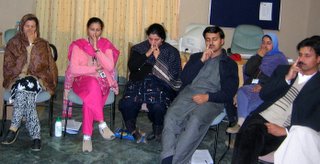 What you see here is a series of pics in which trainees are learning relaxation techniques for themselves as well as their beneficiaries (clients): deep abdominal breathing, Muraqba “Noor” Meditation, and alternate nostril breathing.
What you see here is a series of pics in which trainees are learning relaxation techniques for themselves as well as their beneficiaries (clients): deep abdominal breathing, Muraqba “Noor” Meditation, and alternate nostril breathing.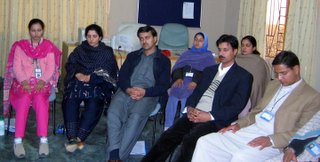
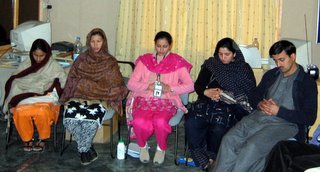
Trainees in the heavily affected areas of Muzzafarabad and Mansehra spoke glowingly about the emphasis PAWB lays on self-care. Here are their words:
“In our work we really forget our self…”
“This was a very very good learning environment”
“…doctors we needs more workshops…”
And excerpted from a letter written by a field coordinator after the training: “During relief work due to continuous work I was so much tyred mentally and physically but after today training I am feeling now very well and become so much easier through breathing and murakabah exercises.”
Dedication of the Trainees
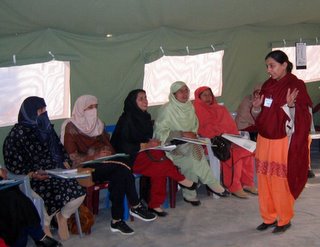
December 25th meant a day of rest for the PAWB team. Arvinder (seen standing here) flew back to her family in Delhi, Khalida spent time with her family in Pindi, and I bummed around watching movies and documenting our last few days of training in Northern Pakistan.
In addition to rest for us, I pray that all the trainees we have met are finding more time for their own rest.
The dedication of the trainees is mind-boggling to me. They do and say things that are unheard of. For our Muzaffarabad training on Dec 22nd, one group of young relief workers from Bagh started their day at 2:30am. They walked in the bitter cold in order to meet up with other colleagues at 3:30. They caught transport at 4am and finally arrived at the training camp site at 7:30am. In light of such dedication, I felt that I could at least put in a little work on my 'day of rest.'
Advocating for our Children -- Idara-e-Taleem-o-Aagahi
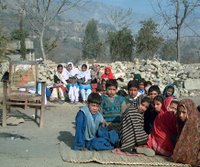
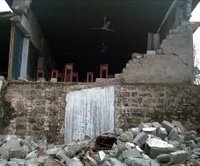 Children attend open-air schools in the Northern Areas as many of their schools have been left looking like the one on the right.
Children attend open-air schools in the Northern Areas as many of their schools have been left looking like the one on the right.Idara-e-Taleem-o-Aagahi is a well-established and highly respected organization that prioritizes the education of Pakistan's children. For the PAWB trainings, ITA has been able to marshal the support of the Gov't of Pakistan, UNICEF, and several key NGOs. PAWB has been blessed by ITA's hosting of our Pakistan trainings in a way that can only be called extraordinary and prescient. They anticipated all of our personal needs and exceeded all of our expectations.
Wednesday, December 21, 2005
TESTIMONIALS from the first training day
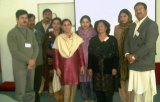 Arvinder is our deeply committed trainer and therapist from New Delhi. She is wearing the cream colored dupatta here.
Arvinder is our deeply committed trainer and therapist from New Delhi. She is wearing the cream colored dupatta here. “Sessions were very useful. I like the first session with Arvinder -- particularly useful based on trauma conditions. The workshops conducted today, and method used in that, I will try my best to implement. I will train other people so that they could use with others as well.”
“I found training on alternative healing very helpful. The discussions we had, and the exercises we learnt were very simple but beneficial”.
[One of the effects of compassion fatigue is that relief workers lose touch with their own selves.] “Being in emergency work, I forgot myself as a human, it made me realized to make my efforts more productive, not only in field work, but also to myself”
“Such workshops should be conducted on a large scale, so other could learn more useful techniques and implement them”
“As a special education teacher, I can use these skills in my school, and especially for myself, because self-care is also a very important factor”
“What I have learnt today will help me to provide psychosocial support to survivors of earth quake, and provide training”
“Training should be extended up to three or four days, and cover more topics”

First Day of training -- getting started with yoga
 Dec 20, 2005
Dec 20, 2005Islamabad
Today at 8am Siddharth began by teaching a hatha yoga class in Islamabad. Two people came on time. We got started with Suryanamaskar, about 5 of them; and then we sat in meditation. After a body scan revealing whether we should work on upper body opening (upper back, shoulders, neck) or lower body (lower back, hips, thighs), we got into a routine designed to bring focal relief and teach body awareness. This caught the imagination of the group that had since gathered. We were up to about 10 people, more than our small room could accommodate. People basically took turns using the same space to stretch out. As is often said among desis, “you have to adjust.”

Ms. Khalida Sheikh -- One of our trainers
 Khalida Sheikh is a talented psychotherapist from the UK who works with a diverse population of Muslims in Bradford as part of the National Health Service. Specializing in transcultural mental health training, she manages a team of therapists.
Khalida Sheikh is a talented psychotherapist from the UK who works with a diverse population of Muslims in Bradford as part of the National Health Service. Specializing in transcultural mental health training, she manages a team of therapists. 
Almost didn't make the plane
Dec 19, 2005
New Delhi
Arvinder & Siddharth have tickets to Pakistan today, but one of them doesn’t have a visa. Even though PAWB considers Arvinder irreplaceable, even though our partner organization in Pakistan (ITA) has spent countless work hours on justifying her expertise to the Pakistani High Commission, the fact is that Arvinder was born in India! Siddharth, on the other hand, went to the consulate in New York City one day, dropped off an application and his passport at 12 noon, and picked up a fresh stamped visa at 4:30pm the same day.
We are sitting across from a man in the High Commission who really wants to see Arvinder go to Pakistan. Not only because PAWB has work to do that he admires, but also because Arvinder’s mother was born around where PAWB is going to travel. So this man is not being obstructive. In fact, no one we meet actually says “We have a problem with your Indian citizen PAWB member…” But there is a problem nevertheless. While Siddharth got an experience of wiling away half a day at the High Commission, Arvinder has come here 2 times, waiting in outside lines with no promise that her case will get any attention that day. Meanwhile, she loses time with her clients. Meanwhile, Arvinder has had to turn down consultancy offers because she wants to do PAWB work. Still, limbo characterized her life for a good 3 weeks.
Part of the stress of doing relief work is the need to be ready for deployment. And part of being ready for deployment is readiness NOT to be deployed. Arvinder had a very long introduction to this basic meditation (or should we say frustration?) that all relief workers learn early.
“You know we have hundreds of faxes per day. We have to manage that.” Finally, finally, that faxed letter was located at the High Commission. And things were done in a shockingly short stroke of the pen. It almost seemed bizarre that after hours and hours of effort on the part of ITA and Arvinder, this visa was essentially someone saying “I knew all along that you should be allowed to come, but having you wait until the VERY last second is our way of letting you know who is really in control here.” That wasn’t the attitude of the official who helped us. He wanted to then give a visa to Arvinder’s mother right there, on the spot, no questions asked…
We made it to the airport with only 30 minutes to spare. One wrong move, one hour more of a delay in finding that fax, and Arvinder would have been lost as a fieldworker in this first PAWB project.
New Delhi
Arvinder & Siddharth have tickets to Pakistan today, but one of them doesn’t have a visa. Even though PAWB considers Arvinder irreplaceable, even though our partner organization in Pakistan (ITA) has spent countless work hours on justifying her expertise to the Pakistani High Commission, the fact is that Arvinder was born in India! Siddharth, on the other hand, went to the consulate in New York City one day, dropped off an application and his passport at 12 noon, and picked up a fresh stamped visa at 4:30pm the same day.
We are sitting across from a man in the High Commission who really wants to see Arvinder go to Pakistan. Not only because PAWB has work to do that he admires, but also because Arvinder’s mother was born around where PAWB is going to travel. So this man is not being obstructive. In fact, no one we meet actually says “We have a problem with your Indian citizen PAWB member…” But there is a problem nevertheless. While Siddharth got an experience of wiling away half a day at the High Commission, Arvinder has come here 2 times, waiting in outside lines with no promise that her case will get any attention that day. Meanwhile, she loses time with her clients. Meanwhile, Arvinder has had to turn down consultancy offers because she wants to do PAWB work. Still, limbo characterized her life for a good 3 weeks.
Part of the stress of doing relief work is the need to be ready for deployment. And part of being ready for deployment is readiness NOT to be deployed. Arvinder had a very long introduction to this basic meditation (or should we say frustration?) that all relief workers learn early.
“You know we have hundreds of faxes per day. We have to manage that.” Finally, finally, that faxed letter was located at the High Commission. And things were done in a shockingly short stroke of the pen. It almost seemed bizarre that after hours and hours of effort on the part of ITA and Arvinder, this visa was essentially someone saying “I knew all along that you should be allowed to come, but having you wait until the VERY last second is our way of letting you know who is really in control here.” That wasn’t the attitude of the official who helped us. He wanted to then give a visa to Arvinder’s mother right there, on the spot, no questions asked…
We made it to the airport with only 30 minutes to spare. One wrong move, one hour more of a delay in finding that fax, and Arvinder would have been lost as a fieldworker in this first PAWB project.
Friday, December 16, 2005
From groundwork to fieldwork
My flight to New Delhi is today, and Inshallah, I will be joining the others in the first clinical team in Islamabad, Pakistan on Monday. The last two months of launching PAWB and preparations to work in South Asia have been blessings to me. Blessings because not only has PAWB consolidated dozens of relationships that I knew I had, but also through the challenges of the PAWB launch, I have learned just how resilient, flexible, and potent those relationships are. Thich Nhat Hanh speaks of Interbeing, and I feel it profoundly.*
If you can, please visit the PAWB blog every 4-5 days and see what our clinical team is doing. The website (http://pawb.cfsites.org/) may get updates, but the blog will be the key way to get current news. Your comments, ideas, referrals are welcome.
I want to thank everyone who came to the Fundraiser Luncheon on December 10, 2005. There were many others who wanted to come, and I felt them in spirit. It was a simple affair: expertly prepared food that had everyone asking for recipes, PAWB supporters networking with each other, and a wave of support that flowed into anything and everyone that is involved with the PAWB mission.
My gratitude goes out for all your contributions – whether it be running errands, editing text, giving funds, or extending the psycho-spiritual.
Siddharth
*For those who demand strict adherence to definitions, Interbeing is an English approximation of pratitya samutpada, dependent co-arising. It does not require that we be aware of it – it simply is what is. But it is a blessing to abide in it, and that is what transpires in these moments of great synchronicity and cooperative action.
If you can, please visit the PAWB blog every 4-5 days and see what our clinical team is doing. The website (http://pawb.cfsites.org/) may get updates, but the blog will be the key way to get current news. Your comments, ideas, referrals are welcome.
I want to thank everyone who came to the Fundraiser Luncheon on December 10, 2005. There were many others who wanted to come, and I felt them in spirit. It was a simple affair: expertly prepared food that had everyone asking for recipes, PAWB supporters networking with each other, and a wave of support that flowed into anything and everyone that is involved with the PAWB mission.
My gratitude goes out for all your contributions – whether it be running errands, editing text, giving funds, or extending the psycho-spiritual.
Siddharth
*For those who demand strict adherence to definitions, Interbeing is an English approximation of pratitya samutpada, dependent co-arising. It does not require that we be aware of it – it simply is what is. But it is a blessing to abide in it, and that is what transpires in these moments of great synchronicity and cooperative action.
Wednesday, December 14, 2005
Mission of PAWB
 1. Psychosocial First Aid Capacity-Building for people working with trauma/disaster survivors
1. Psychosocial First Aid Capacity-Building for people working with trauma/disaster survivors2. Managing Humanitarian & Relief Workers Stress/Burnout/Compassion Fatigue
3. Ethnomedical Competence -- Integrating capacities of local healers with Western psychotherapy/psychiatry

Monday, December 12, 2005
Launch of Psychological Assistance Without Borders
PAWB came together Oct 2005 when several people showed support for its mission of capacity-building for relief workers and humanitarian volunteers. Serving victims of the 2005 earthquake in South Asia was the first rallying point.
Subscribe to Comments [Atom]